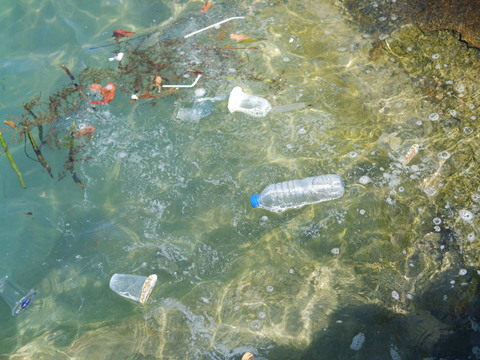
The European Union has signed the Bridge to Busan Declaration, aiming to establish an international, legally binding instrument that moderates the production of primary plastic polymers and tackles the impacts of plastic pollution.
With the production of primary plastic polymers expected to increase ‘exponentially’ through 2050 if left unaddressed, national waste management and recycling programmes could be overloaded by high waste levels. It is feared that, at its current rate, the world will miss targets to end plastic pollution and limit global average temperature rise to less than 1.5° Celsius, contradicting the Paris Agreement.
Tackling the production of primary plastic polymers is said to be ‘one of the most efficient and cost-effective approaches to managing the plastic pollution problem’; and the Declaration’s signatories believe that the burden of efforts should be equitably distributed between countries, ensuring that each has a part to play across the full plastic life cycle.
Therefore, the signatories intend to achieve more sustainable levels of production for primary plastic polymers. They aim to keep production rate proportionate to the vision of a circular economy for plastics, and to the Paris Agreement’s cap on global temperature increase.
Furthermore, they highlight the importance of transparency. Data on primary plastic polymer production should be reported to close information gaps, weigh up progress, and contribute to the re-evaluation of priorities wherever necessary, they say.
Additionally, a global objective surrounding primary plastic polymer production should be established. This could potentially cover production freezes at particular levels, reductions against agreed baselines, or other constraints to prevent unsustainable production.
Endorsed by countries and stakeholders of the Intergovernmental Negotiating Committee (INC), the Declaration aligns with the mandate of United Nations Environment Assembly (UNEA) Resolution 5/14, which has similar aspirations to introduce worldwide restrictions on pollution across the full plastic life cycle.
The European Union joins 33 other signatories, encompassing Europe, Africa, Asia, Oceania, South America, and the Caribbean. Stakeholders include A Plastic Planet, the Ellen MacArthur Foundation, the Polish Zero Waste Association, the Innovation Alliance for a Global Plastics Treaty, and WWF.
In similar news, Packaging Europe has been covering the development of a Global Plastics Treaty, stemming from the United Nations Environment Programme (UNEP)’s international vote agreeing to establish a global framework and end plastic pollution. After INC-4 took place in Nairobi this summer, we spoke to Erin Simon, vice president and head of Plastic Waste and Business at WWF, who attended the event and weighed in on its developments.
Similarly, our senior writer, Victoria Hattersley, brings us a report on its progress so far, and spoke to Magnus Løvold of the Norwegian Academy of International Law in a podcast to find out what work we still have left to do at INC-5.
Meanwhile, the United States’ Biden-Harris Administration has shared its plastic pollution strategy in a new report. If re-elected in the 2024 presidential race, it plans to phase out all single-use plastics across US federal government agencies by 2035 and all single-use plastic products in foodservice, packaging, and events by 2027.
If you liked this story, you might also enjoy:
How are the top brands progressing on packaging sustainability?
Sustainable Innovation Report 2024: Current trends and future priorities
Reuse vs. single use – which is better for the environment?
The ultimate guide to global plastic sustainability regulation













No comments yet